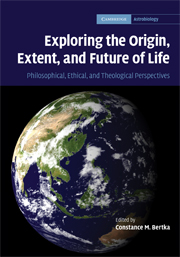 Exploring the Origin, Extent, and Future of Life
Exploring the Origin, Extent, and Future of Life Book contents
- Frontmatter
- Contents
- List of contributors
- Acknowledgements
- 1 Astrobiology in a societal context
- Part I Origin of life
- Part II Extent of life
- Part III Future of life
- 13 Planetary ecosynthesis on Mars: restoration ecology and environmental ethics
- 14 The trouble with intrinsic value: an ethical primer for astrobiology
- 15 God's preferential option for life: a Christian perspective on astrobiology
- 16 Comparing stories about the origin, extent, and future of life: an Asian religious perspective
- Index
- References
15 - God's preferential option for life: a Christian perspective on astrobiology
from Part III - Future of life
Published online by Cambridge University Press: 29 December 2010
- Frontmatter
- Contents
- List of contributors
- Acknowledgements
- 1 Astrobiology in a societal context
- Part I Origin of life
- Part II Extent of life
- Part III Future of life
- 13 Planetary ecosynthesis on Mars: restoration ecology and environmental ethics
- 14 The trouble with intrinsic value: an ethical primer for astrobiology
- 15 God's preferential option for life: a Christian perspective on astrobiology
- 16 Comparing stories about the origin, extent, and future of life: an Asian religious perspective
- Index
- References
Summary
Why should we care about Christian ethical perspectives on astrobiology?
Why should we care about a Christian ethical perspective on astrobiology? After all, the world is becoming an increasingly pluralistic society, with a rich plethora of different religious and philosophical perspectives. Why should we care about what Christians or any other religious group thinks about the ethics of space exploration? For that matter, we may question whether there should be any ethical concerns about astrobiology or the ethics of space exploration at all.
We stand on the brink of an exciting new age in space exploration and science. Already, we have discovered extrasolar planets in our galaxy, launched several very successful robotic missions to Mars, and lifted our gaze above the clouds of Earth through the Hubble and Spitzer space telescopes. This promises to be just the beginning, a foretaste of what is yet to come! In the next twenty years, we could well discover evidence of simple, microbial extraterrestrial life in our solar system – if it exists. In addition, NASA has enterprising plans for the exploration of space beyond our own solar system. The discovery of advanced, intelligent extraterrestrial life remains an intriguing possibility. At the heart of NASA's research strategy is astrobiology, a newly emerging science that will study the origin, extent, and future of life – both in space and on planet Earth. At last, through astrobiology humans are ready to make that gigantic leap off our small planet and become a genuine space-faring species.
- Type
- Chapter
- Information
- Exploring the Origin, Extent, and Future of LifePhilosophical, Ethical and Theological Perspectives, pp. 281 - 302Publisher: Cambridge University PressPrint publication year: 2009
References
- 3
- Cited by
